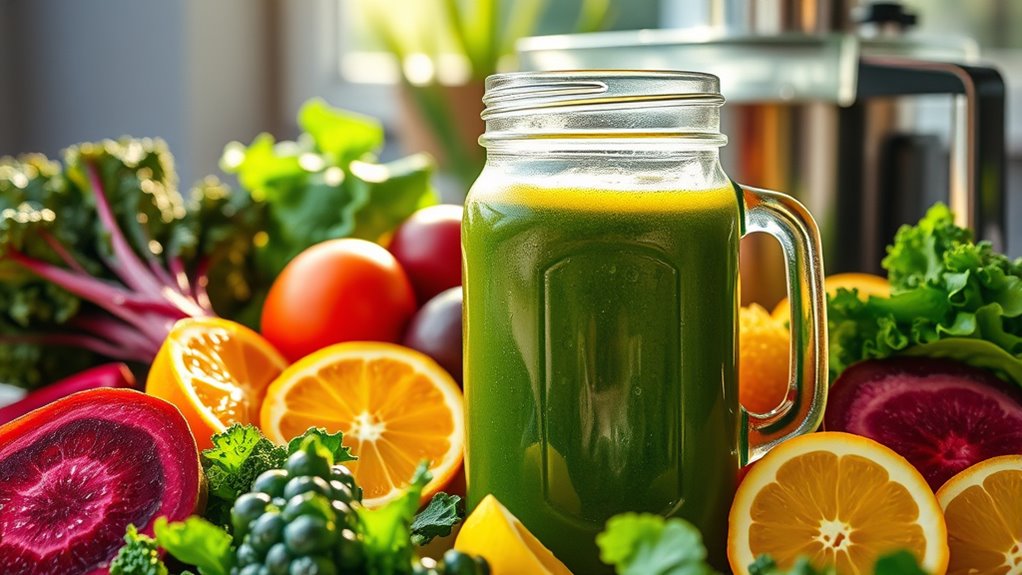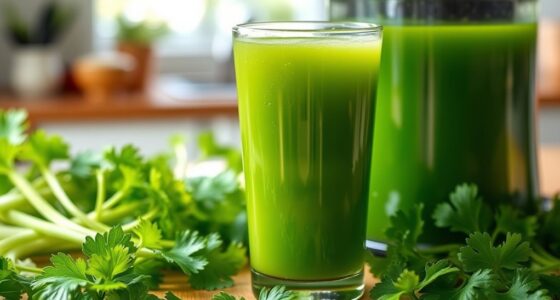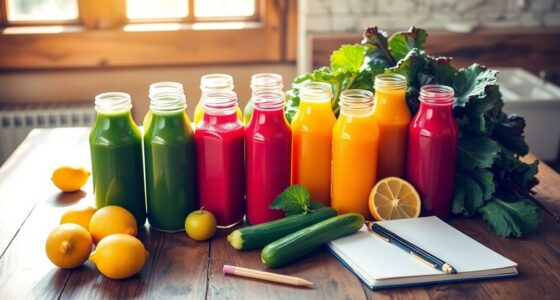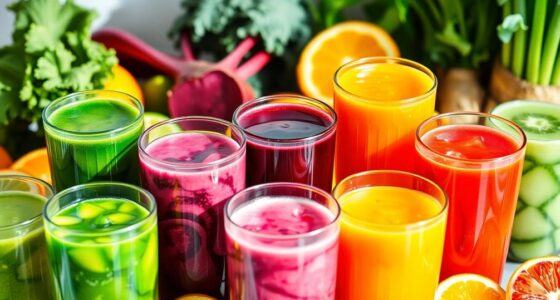Juicing can be a quick energy boost, packed with vitamins and minerals. It’s a concentrated way to enhance your nutrition, but be cautious of the high sugar content. Juices lack fiber, which can lead to increased hunger and cravings. While they offer detox benefits, they might not keep you satiated like whole fruits do. If you want to make the most of your juicing journey, stick around to discover healthier alternatives and tips for balanced nutrition.
Key Takeaways
- Juicing offers a concentrated source of vitamins and minerals, boosting energy levels and enhancing overall well-being.
- Low-calorie leafy green juices provide a nutrient boost while keeping energy levels stable throughout the day.
- Antioxidants in juices assist in detoxification, promoting a cleaner system and increased energy.
- Balancing juices with leafy greens can reduce high sugar content, preventing rapid insulin spikes and energy crashes.
- Combining juicing with whole foods ensures essential nutrients and fiber intake, optimizing energy and health benefits.
Is Juicing Healthy for You?
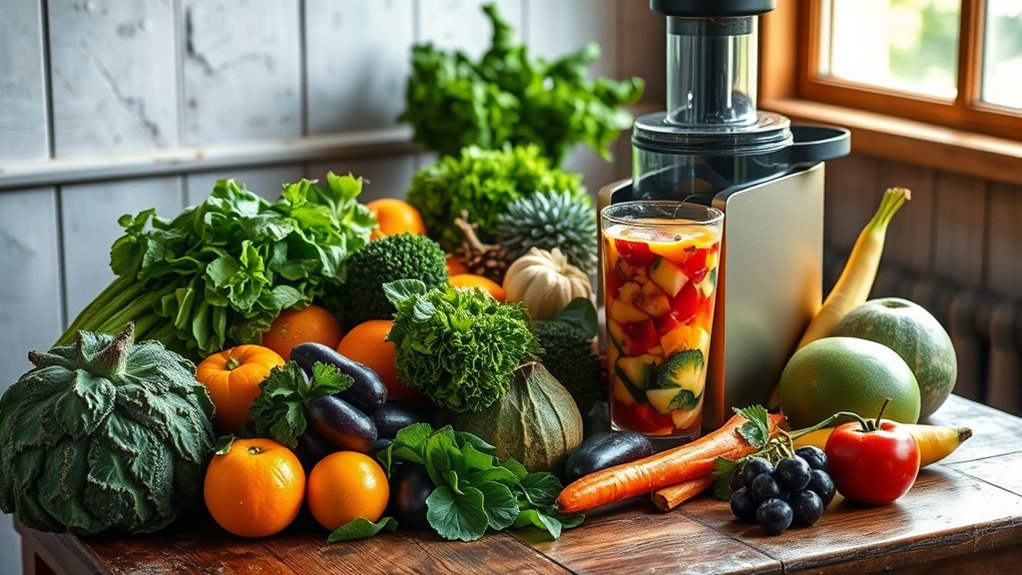
Is juicing truly a healthy choice for you? While juicing offers some health benefits, it’s important to take into account its drawbacks.
Juices can provide a concentrated source of vitamins and minerals, boosting your energy levels. However, they usually lack dietary fiber, which is essential for digestion. This absence can lead to increased hunger and overeating later.
Plus, the high sugar content in fruit juices can cause rapid spikes in blood sugar, making them less suitable if you’re concerned about diabetes.
Juicing alone mightn’t provide adequate nutrition if used as a meal replacement since it often lacks essential nutrients found in whole fruits and vegetables. Additionally, a well-balanced diet should include whole foods rich in fiber to maximize nutritional benefits.
Balance is key—incorporate juicing with whole foods for ideal health.
Nutritional Benefits of Fresh Juice
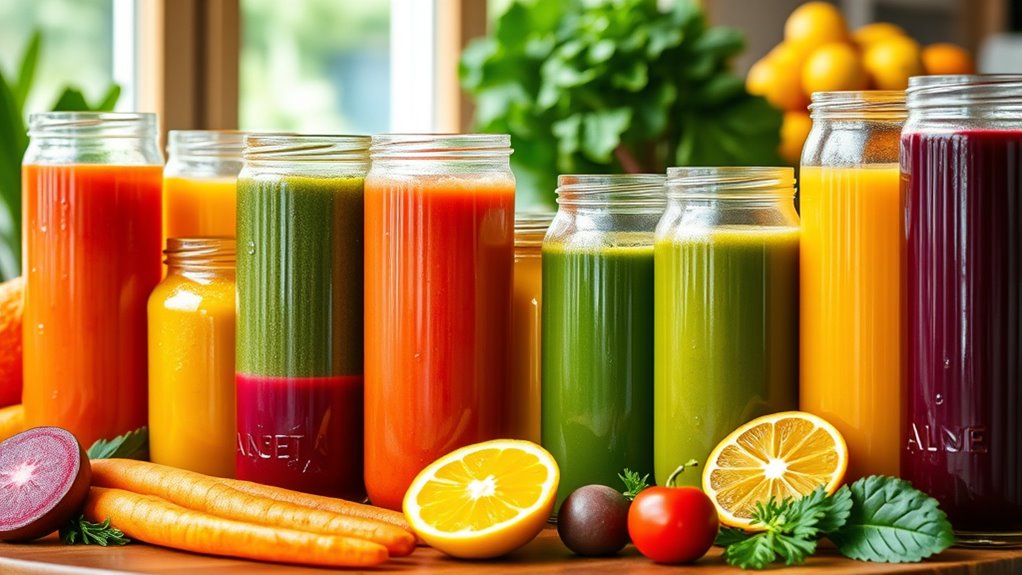
Fresh juice offers a vibrant way to boost your nutritional intake, providing a concentrated source of essential vitamins and minerals that can enhance your energy levels and overall well-being.
By incorporating freshly squeezed juices into your diet, you can enjoy significant nutritional benefits:
- Supports Energy Metabolism: Juices packed with vitamin C and potassium help your body convert food into energy efficiently.
- Detoxification Aid: Antioxidants from whole vegetables assist in cleansing your system, promoting liveliness and renewal.
- Low-Calorie Nutrient Boost: Leafy green juices deliver essential nutrients without piling on calories, keeping you energized throughout the day.
Additionally, juicing wheatgrass can further enhance your energy levels due to its rich vitamin and mineral content.
Embrace the power of fresh juice to invigorate your health and nourish your body!
The Drawbacks of Juicing
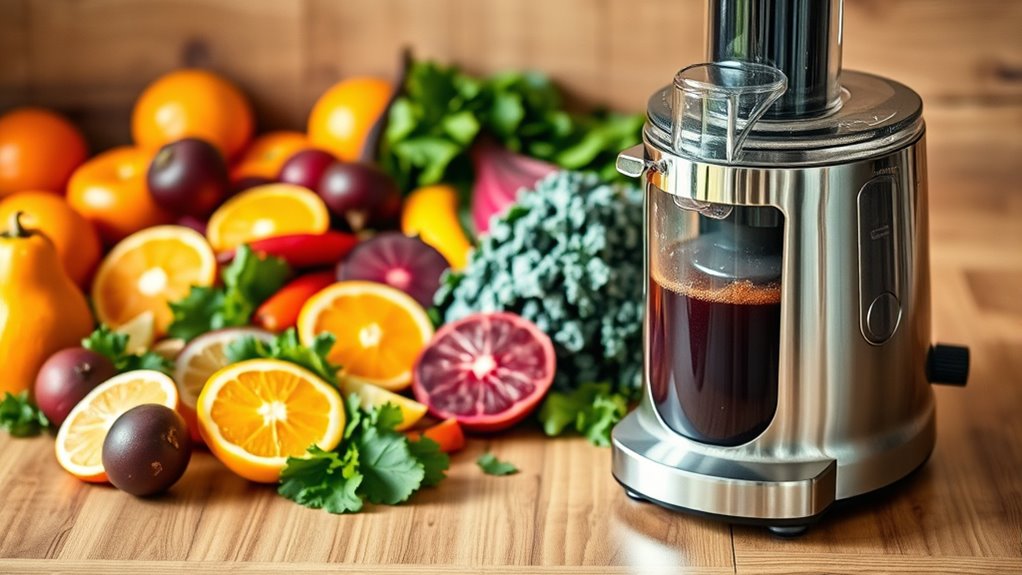
While juicing might seem like a quick way to boost your energy, it often comes with drawbacks.
The high sugar content in most juices can spike your insulin levels, leaving you feeling hungrier later.
Plus, without the fiber found in whole fruits and vegetables, you might miss out on the satisfying fullness that helps manage your appetite. Additionally, many juices lack the health benefits that whole fruits and vegetables provide, such as essential nutrients and antioxidants.
High Sugar Content
Many people enjoy juicing for its invigorating taste and perceived health benefits, but the high sugar content can be a hidden drawback.
When you’re drinking juice, you might unknowingly consume excess calories and sugar, leading to potential weight gain. Here are three reasons to be cautious:
- Juices can contain the sugar equivalent of several whole fruits, making it easy to overindulge.
- The absence of fiber means your body absorbs sugar quickly, causing energy spikes and crashes.
- Liquid calories from juice are less satisfying, often resulting in increased cravings and overeating later.
Being mindful of the high sugar content in your juice can help you maintain a balanced diet and avoid unwanted weight gain.
Lack of Fiber
How can you enjoy the benefits of fruits and vegetables when juicing strips away their essential fiber? Without fiber, you miss out on healthy digestion and that full feeling that helps with weight management. Juicing can lead to rapid sugar absorption, causing blood glucose spikes that leave you hungry and prone to overeating later. Plus, the lack of fiber diminishes overall health benefits linked to a high-fiber diet, which reduces risks of diabetes, heart disease, and obesity. You might find that liquid calories aren’t as satisfying, leading to unwanted weight gain. Additionally, without adequate fiber, you could experience digestive issues and constipation. Incorporating chia seeds into your diet can help provide the essential fiber you need for better satiety and weight management. To truly benefit from fruits and veggies, consider incorporating them whole into your diet.
Juice vs. Whole Fruits: A Fiber Debate
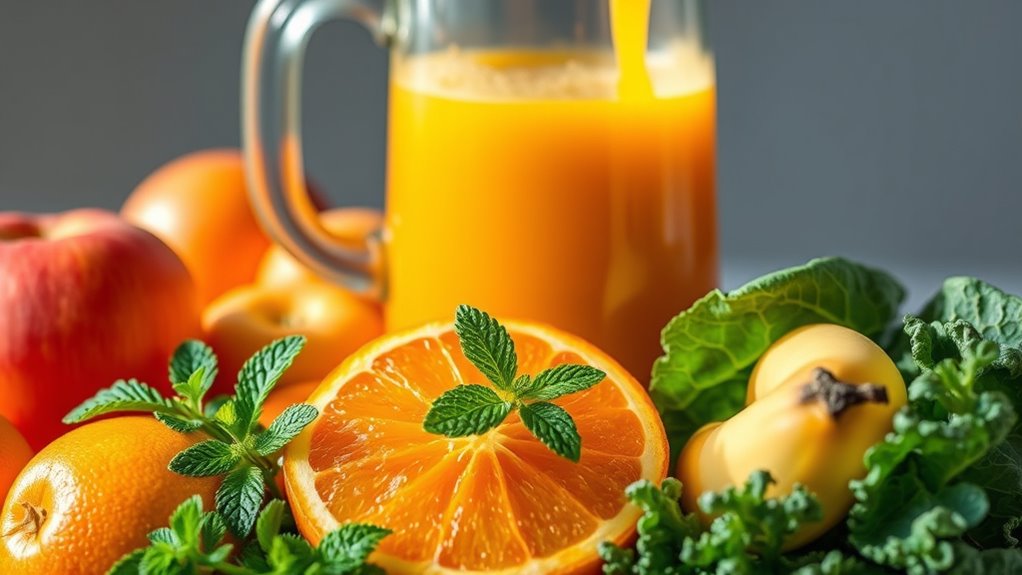
When you choose between juice and whole fruits, it’s important to contemplate the role of dietary fiber in your diet. Whole fruits are packed with fiber, helping you feel full longer and slowing sugar absorption. In contrast, juice lacks this essential component, often leading to quick sugar spikes and increased hunger.
Consider these points:
- Fiber-rich fruits keep you satisfied, reducing the risk of overeating.
- Juice can lead to insulin spikes, making you crave more sugar.
- Whole fruits support better digestion, promoting overall health.
Incorporating fiber-rich whole fruits into your meals not only enhances your nutritional balance but also supports a healthier lifestyle, making them a more satisfying choice than juice. Additionally, blending fruits into juice can result in the loss of important nutrients, diminishing the overall health benefits you might gain from consuming whole fruits.
The Impact of Sugar in Juices
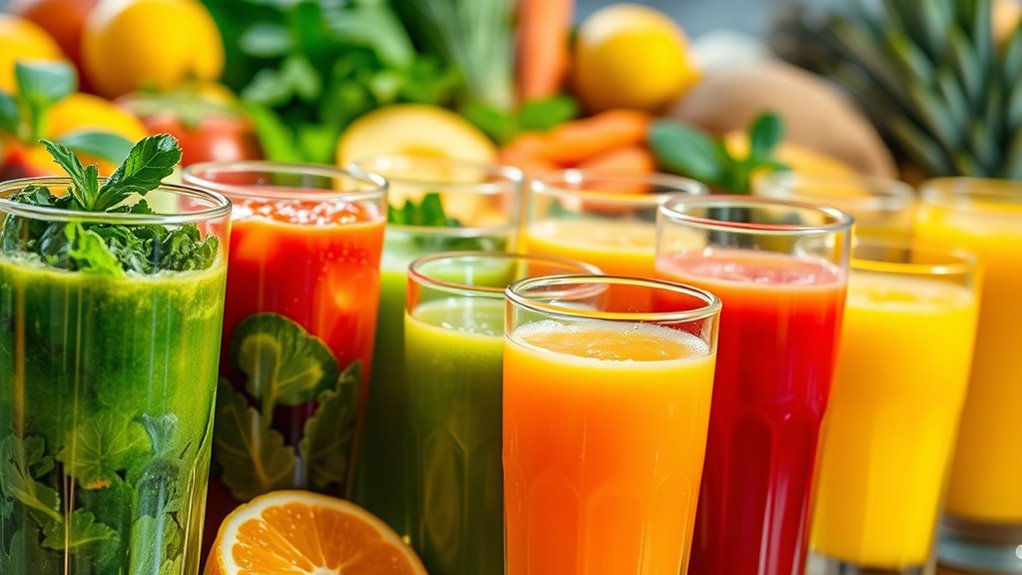
When you drink juice, your body absorbs sugar quickly, which can spike your insulin levels just like added sugars do.
Unlike whole fruits, juices lack fiber, leading to higher sugar intake and less satisfaction, leaving you hungrier sooner.
This difference between liquid and solid calories can affect your overall health and weight management. Additionally, juices like celery juice can offer health benefits but should be consumed mindfully to avoid excessive sugar intake.
Sugar Absorption Rates
Although juices can seem like a healthy choice, their sugar absorption rates can have significant implications for your body. When you drink juice, you’re consuming natural sugars without the fiber found in whole fruits. This leads to rapid sugar absorption, causing insulin spikes that can increase your hunger and cravings.
Here are three key points to reflect on:
- Juices can add excess sugar and calories to your diet, sabotaging your weight loss goals.
- They raise your diabetes risk by 16%, unlike whole fruits that provide protective fiber.
- The absence of fiber in juices may cause blood sugar crashes, leaving you feeling hungry soon after.
Being aware of these factors can help you make smarter choices for your health.
Liquid vs. Solid Calories
Juices mainly contain natural sugars, which your body processes like added sugars, leading to insulin spikes and crashes. Unlike solid foods, which have fiber to help regulate sugar absorption, juices lack this essential component.
This means they’re less satisfying and can lead to overeating later. Studies show that liquid calories are less filling than calories from solid foods, increasing the risk of weight gain.
Even small amounts of juice can cause rapid sugar absorption, leaving you feeling hungry soon after. So, be mindful of those liquid calories when you’re reaching for that next juice! Additionally, some juices, like celery juice, are praised for their health benefits, but they can still contribute to liquid calorie intake.
Smoothies: A Healthier Alternative?
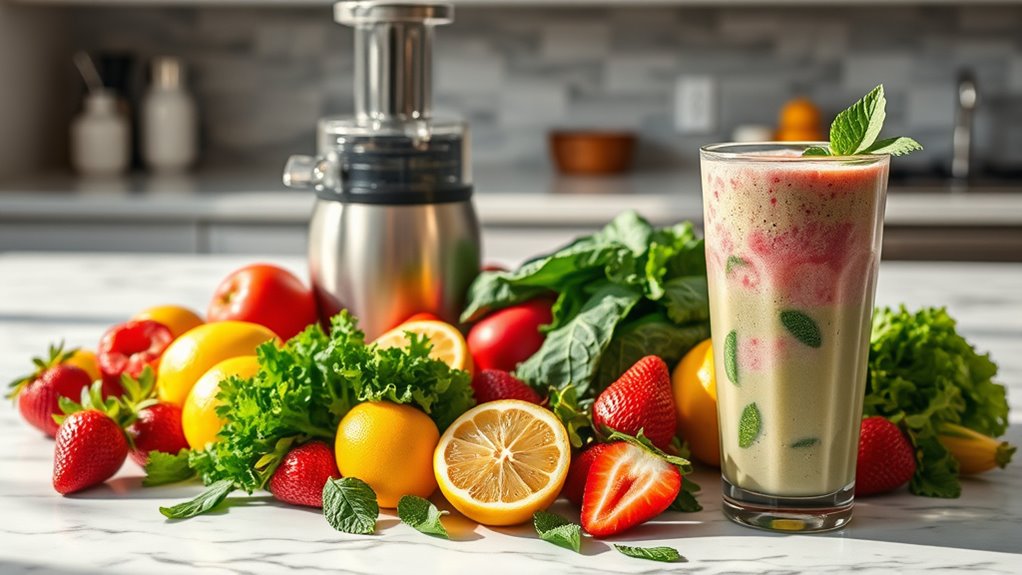
Here are three reasons to contemplate smoothies:
- Balanced Blood Sugar: Smoothies provide a steadier nutrient intake, preventing rapid spikes in blood sugar.
- Customizable Nutrition: You can easily add protein and healthy fats, creating nutrient-dense options tailored to your health goals.
- Satisfaction Factor: Solid foods like smoothies are more satisfying than liquid calories, helping you manage weight without feeling deprived.
With endless combinations of fruits, vegetables, nuts, and seeds, smoothies can energize your day while keeping you full and focused! Additionally, incorporating whole grains into your smoothies can enhance their fiber content, further promoting digestion and satiety.
Juicing and Weight Management
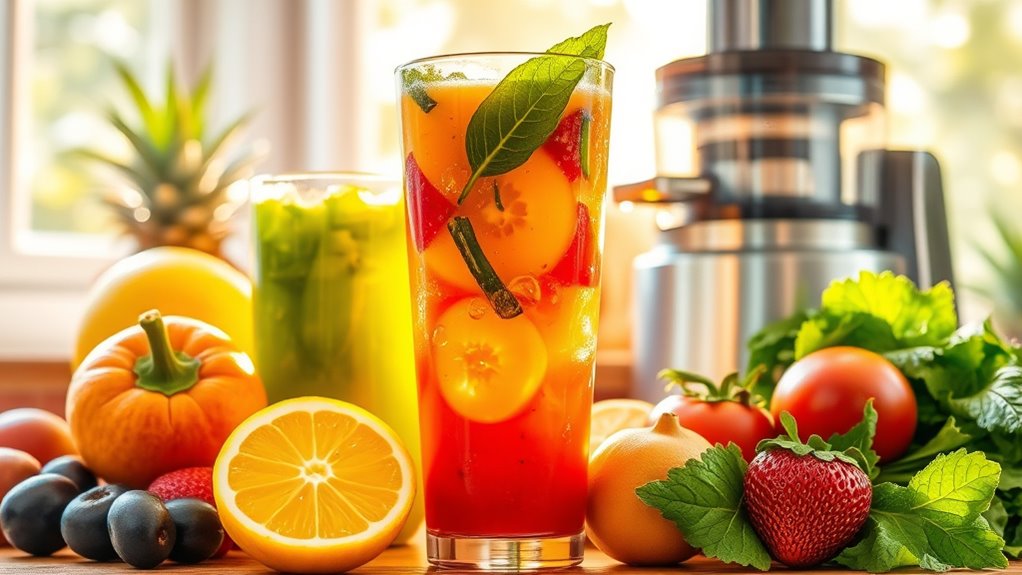
Juicing may seem like a quick way to boost your energy, but it often falls short when it comes to weight management. Juice cleanses lack essential nutrients like fiber and protein, which are crucial for promoting fullness. Consuming juice can lead to increased hunger and overeating due to high sugar content. Liquid calories, such as those from juice, are less satisfying than solid ones, complicating your weight management efforts. Additionally, juicing can cause rapid spikes in blood glucose levels, triggering cravings. Instead, consider incorporating fiber-rich ingredients in smoothies for better appetite control and a healthier life. Furthermore, juices high in sugar content can significantly affect your energy levels, leading to a cycle of energy crashes and cravings.
| Juicing Effects | Weight Management Impact |
|---|---|
| Lacks fiber | Increases hunger |
| High in sugar | Contributes to overeating |
| Causes blood glucose spikes | Complicates weight loss |
| Less satisfying | May lead to weight gain |
Making Informed Choices in Juicing
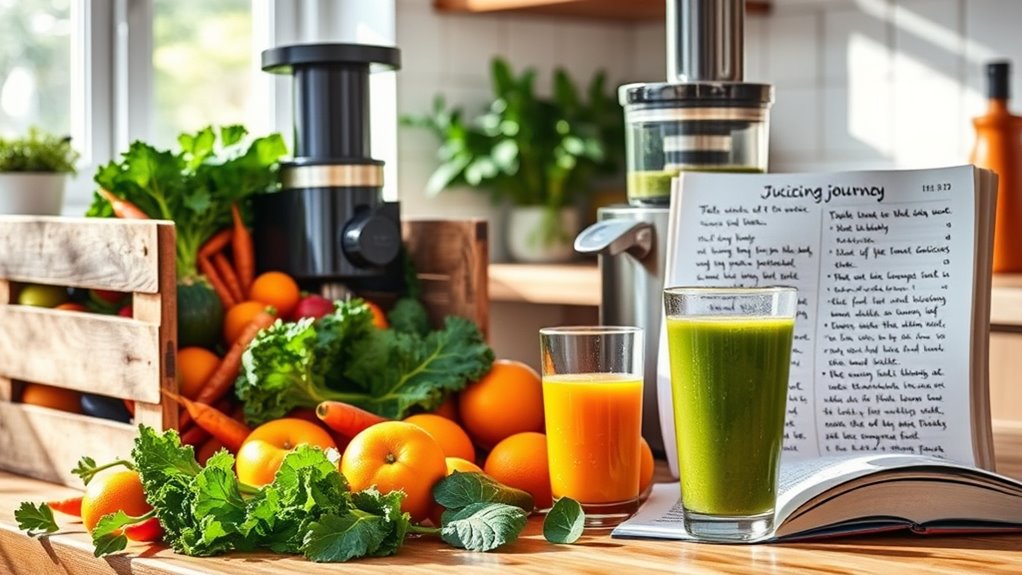
When you explore the world of juicing, making informed choices can greatly impact your health and energy levels. Here are three key tips to guide you:
- Balance your juices: Mix cold-pressed juices with leafy greens to reduce sugar intake while boosting nutrient absorption.
- Choose wisely: Opt for juices rich in functional ingredients like probiotics and antioxidants, supporting your overall wellness.
- Invest in quality: A good masticating juicer preserves nutrients and maximizes extraction, ensuring you get the best from your fruits and vegetables. Additionally, incorporating whole, unprocessed foods into your diet can enhance the benefits of juicing and improve your overall health.
Frequently Asked Questions
Does Juicing Really Give You Energy?
Juicing can give you a quick energy boost, thanks to the natural sugars and vitamins in fruits and vegetables.
However, you might experience rapid blood sugar spikes, leading to energy crashes later. If you stick to lower-sugar juices, like those made from leafy greens, you could enjoy more sustained energy.
That said, smoothies with whole fruits and veggies can provide a more balanced energy lift, keeping you full and energized longer.
Why Do I Feel Tired After Juicing?
You might feel tired after juicing because the lack of fiber can cause blood sugar spikes, followed by crashes that leave you drained.
If you’re replacing solid meals with juice, you could be missing essential nutrients like protein and healthy fats, which are vital for energy.
Additionally, if you’re stressed about restrictive diets, that mental strain can also contribute to your fatigue.
Consider balancing your juices with whole foods for better energy levels.
Why Are People Against Juicing?
People often criticize juicing for several reasons: it strips away fiber, leaving you unsatisfied; it can spike your blood sugar, especially if you’re diabetic; and it lacks essential nutrients like protein and healthy fats, risking undernourishment.
Additionally, juice cleanses may promise weight loss but usually deliver only temporary results.
Cold-pressed juices, while trendy, pose foodborne illness risks, particularly for those with weakened immune systems.
These factors raise valid concerns about juicing’s overall health benefits.
What Is the 80/20 Rule for Juicing?
The 80/20 rule for juicing suggests you focus on using 80% vegetables and 20% fruits in your blends.
This approach helps you lower sugar content while maximizing nutrient density. By prioritizing vegetables, you avoid blood sugar spikes and boost your vitamin and mineral intake.
Plus, you can get creative with flavors, making your juices more satisfying and nutritious. Following this rule promotes better satiety and helps you maintain a balanced diet overall.
Conclusion
In the whirlwind of wellness trends, juicing might seem like the ultimate energy booster. But as you sip that vibrant juice, remember—it’s not just about the nutrients; it’s the balance that counts. Coincidentally, choosing whole fruits or smoothies often packs in more fiber and keeps sugar levels in check. So, while you enjoy your juice, consider making informed choices that support your overall health. After all, the best energy comes from a well-rounded diet, not just a trendy glass!
Cindy thoroughly researches juicing trends, techniques, and recipes to provide readers with practical advice and inspiration. Her writing style is accessible, engaging, and designed to make complex concepts easy to understand. Cindy’s dedication to promoting the advantages of juicing shines through her work, empowering readers to make positive changes in their lives through the simple act of juicing.

